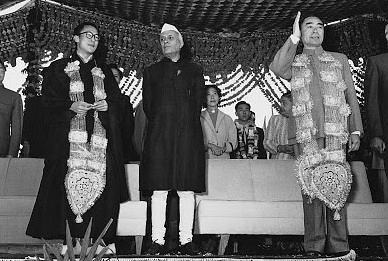
The Emergency
Continuing our anthology of the Sino-Indian War of 1962, we bring you the lead article from the November 8, 1962 issue (written by C. Rajagopalachari) that criticised the union government’s “artificial” policy of non-alignment in the Cold War era.
The pages of SWARAJYA for months past furnish enough material and previous advice for saving Delhi from being ‘shocked’ or ‘surprised’ at the failure of the Soviet Government to support India in her conflict with China. At no time was it a valid or excusable thought that the communist bloc would divide itself in order to help us.
I am glad to note that the Sino-Indian conflict has resulted in a definite change of policy in India, very definite in effect even if not so expressed. There is an effort, however, to put military aid received from the US and UK on a commercial as distinguished from a political basis. The attempt to save non-alignment by such a device is as illogical as economically and financially ruinous in the present critical situation. The Hindustan Times London correspondent says in his dispatch of October 26: “The fall of Tawang, Prime Minister Nehru’s call for a Dunkirk spirit and his confession of having lived out of touch with reality in ‘an artificial atmosphere of our own creation’, have brought to the British public the gravity of our frontier situation.”
What is equally important is that this change of attitude on the part of Sri Nehru has brought relief to the anxious minds of many Indian publicists. They feel with the Daily Telegraph that Sri Nehru has, though belatedly, risen honestly and bravely to meet the country’s crisis. The Daily Telegraph regretfully exclaims: “with how much greater confidence might India now be able to resist the Chinese aggression had she been willing to co-operate in the global defence of the world!” We appeal to the British people and the British press not to make it too difficult psychologically for Sri Nehru to make this urgent and drastic change of policy. He has made a good start in that effort.
The analysis and advice of the Financial Times of London are very sound and important.
A major military effort that is now required against the Chinese would involve very heavy expenditure in expanding road and air transport, constructing and extending bases, and equipping the army with adequate modern weapons.
As India insists on buying arms, in order to preserve its non-alignment policy, the effort would have a direct and very harmful effect on the economy, as India’s reserves now are only 100 million. Preparing for war, moreover, will have serious repercussions on the existing economic structure. The Indian communications network is already stretched to the limit. A build-up on the northern frontier would impose a further possibly intolerable strain on the railways.
Requisition of private road transport would directly and sharply affect the level of industrial production.
Finally, Mr. Desai, the Finance Minister, must be worrying about how he can find the money to pay for a war.
India is now probably the most highly taxed country in the world, if one takes India’s poverty into account. Any increase in taxation is bound to press hard on the very poorest part of the population (and it is to be remembered that the average per capita income in India is of the order of & 25 per annum).
The alternative to higher taxation is to rely solely on inflation to finance the additional expenditure. As it is, prices have risen by some eight percent this summer after a period of comparative stability. Inflationary financing, too, would throw the burden on those least able to pay.
If Mr. Nehru persists in his declared policy of opposing China from a ‘non-aligned’ position, then the Indian people will indeed have to emulate the spirit of Dunkirk if they are to pass the test with which the country is now faced.
The country will be led to bankruptcy if the policy of non-alignment in the cold war is artificially continued when dealing now with the situation created by China which has started a hot war in the India border. Cold war non-alignment has no relevance to the situation as it has now developed. To sell to a belligerent is giving aid as much as a free gift. The technicality of a postponed payment will not convert receiving aid into non-alignment. It is aid to sell to a belligerent who is in dire need of buying to conduct his war.
All by-elections have been cancelled and a Defence of the Realm Ordinance has been issued by the Government. All this may be reasonable in spite of the conflict being limited to the frontier, but it does considerably help the Congress Party to hide its discomfiture, when its policies have been patently proved to be wrong.